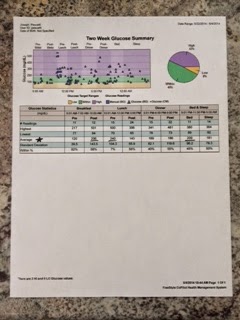This week J started Summer Camp at his school. Last year we were very blessed to have both a teacher's aide and teacher with a lot of experience in diabetes care. We never had to worry about his safety because they were always keeping a close eye on him and knew exactly what to do when something didn't go as planned. Well that comfort was quickly shattered when I showed up to summer camp on Monday morning to go over the basic diabetes care with his new teaching staff.
Mind you J is equipped with all of the latest D-gadgets: A Continuous Glucose Monitor and a Insulin Pump allowing his care to be fairly "easy" and worry free. This allows you have the ability to see what his blood sugars are doing 24/7. No needles, No vials of insulin, just watch his CGM, check his blood sugars and dose the amount of insulin that we or the pump tell you! The teacher (which will be his kindergarten teacher in two years) that has J for the morning session of Summer Camp looked at me like I was speaking a different language when I started talking about his diabetes care. She will have a diabetic child in her classroom this year but she was absolutely blindsided and dumbfounded that she would actually be responsible for any of his care. J attends a private school and they are not bound by the law to provide care or a nursing staff like the public schools and they can actually refuse to provide any care at all! Immediately my heart sank and I began to panic (on the inside).
Being the type of person that I am, I had already made a binder explaining all of his care in layman terms because I knew that he would be around new people. In the binder I have a section with pictures of the symptoms to look out for during Hypoglycemic or Hyperglycemic episodes, a user manual (made by me) for both the CGM and the Insulin Pump, Glucagon instructions and a basic BG chart with the ranges in Green, Yellow and Red sections, what to do when his blood sugar goes into those ranges and last but not least our phone numbers if they have any questions. Thankfully the teacher from last year who was involved in J's care is helping out in the afternoon session of summer camp and helped assure me that she would teach them the ropes and take care of him. I felt a little better but a piece of me knows that when J is not with her, he is with someone who has no idea what to look for or do if a situation arises. I felt so terrible for the ones who had no idea what they were getting themselves into. I am pretty much handing over my child and telling them "Thanks, now keep him alive!"
I can't even begin to put into words the fear that we as parents have when we are trusting strangers with our child's life! All week I have been worried and wondering how he is doing, if they are watching his CGM, if they are reading the binder and educating themselves, if they know how truly important and serious Type 1 Diabetes is and that it must never be taken lightly. We just have to pray and trust that they do and offer any support that they need from us to feel comfortable and confident to care for J.
These situations are what make T1D so difficult for a parent. This disease is a minute by minute management with care given by normal people.....not doctors! We have to keep our son alive and teach those around us how to do the same.
It is not fair that this disease has been taken so lightly by society.
It is not fair that we have to put that stress on teachers, loved ones and family.
It is not fair that we bear the burden of keeping our son alive and healthy.
It is not fair that we have to live in constant fear and worry about what the day holds in store.
IT IS NOT FAIR
Unfortunately, we all learn in one way or another that life doesn't care what is fair and what is not. This is our reality and this is the task that we have been given. I refuse as a parent to let my child suffer because of Type 1 Diabetes! No, I will not home school my child. No, I will not keep him from playing sports. No, I will not prevent him from having ice cream or cake when all of the other children are allowed to just be a kid. No, No, No, I will not!
I will gladly feel panic on this inside and do everything in my power to educate those around him, so he can have normal life experiences. This is our reality and we will face it head on and hopefully teach J to do the same!
We are DIABETES STRONG!
*If you are interested in my school survival binder I have the PDF's available, just email me and I will gladly send them your way :)







